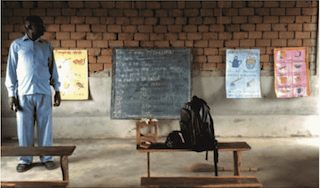Back to School in Uganda Has a Very Different Meaning
Local Volunteers Bring Gifts and Supplies to Africa
By Linda Kay

When UCSC’s head men’s basketball coach, Ron DuBois, picks up his sons from an afterschool program he sometimes asks his sons, “What do we say?” Dominic, 4, and Louis , 6, reply, “Entitled to nothing, grateful for everything.”
I smile. What a great mantra to teach kids at an early age. Here they are in a classroom surrounded with books, toys, games, and craft supplies. They have had a generous snack and have had the opportunity to play on a playground with grass and a play structure.
“Entitled to nothing, grateful for everything.”
Today they have heard their friends brag about their latest Pokémon cards or Beyblade acquired and have seen a robot dog that a classmate brought to share. It is not that Ron doesn’t provide these kinds of things for his sons as well, but he wants to be sure that his sons keep the right perspective. “Entitled to nothing, grateful for everything.”
Recently I had the opportunity to travel with a group to Uganda and met children in schools and churches who lived out the DuBois mantra. Their surroundings were quite different from those in Santa Cruz. There were no toys and few, if any, books. The walls of their classrooms were a combination of corrugated metal, tarps, handmade bricks and cement. The floors were usually hard-packed red dirt, sometimes gravel and occasionally a cement slab. Chairs were usually long wooden benches but sometimes the plastic stackable chairs you sometimes see here at outdoor eating venues. These children had no thoughts of entitlement and yet they were so grateful for everything. So grateful.
Our group, Operation Christmas Child, came to hand deliver gift-filled shoeboxes to these children. The boxes were filled with school supplies, personal hygiene items, accessories and toys packed by people in the U.S. to show the love of Jesus Christ in a tangible way. Simple things that children here take for granted – pencils, tooth- brushes, soap – were received with such joy. They would squeal with delight over headbands and sunglasses. Items like Play Doh, watercolor sets and colorful pipe cleaners, once explained, opened their minds to creativity. Flattened soccer balls were quickly inflated with the accompanying ball pump and a spontaneous game of soccer took place. Entitled to nothing, grateful for everything.
One dad saw his son open a box that included tools – a hammer, tape measure and screwdriver. his eyes welled up. He said he had hoped his son would grow up to be an engineer and these tools would make help prepare him. A 14-year-old boy discovered a calculator in his box. He was delighted. I asked him, “Do you like school?” “Oh yes!” “What are your favorite subjects?” “Math and science.” “What would you like to do once you finish school?”, “I would like to be a biologist.”
Entitled to nothing, grateful for everything.
Ann, a Ugandan national, traveled with us. Professionally she is a teacher of teachers. I asked about the school system in Uganda. “Is there public school? Do all Ugandan children have the opportunity to go to school.”
“Public school is available to all children, but the children may arrive to find there is no teacher. The teachers are poorly paid, if paid at all. So, they may forego their teaching responsibilities if they have an opportunity elsewhere to provide for their families. If parents want their children to really be educated they must send them to a private school,” Ann explained.
“How much does private school cost?”
“It varies. On an average, in American money, it would be equivalent to $100 per semester. We have three semesters per year. With that they may get a t-shirt or some sort of uniform, a meal and maybe some medical help,” Ann answered. I had seen a lot of signs along the roads in Kampala pointing to various schools. But as one moved away from the big city private schools were less likely to be found.
I talked to sam, another Ugandan national who also was accompanying our group, about his education. Sam said that he grew up outside the city area in a single-parent home. His mom was able to raise enough fruits and vegetables to feed them but there was no income. At a young age he would dig in other people’s gardens to earn money, so he could go to school. He would look for anything he could do to raise the funds he needed. He said that when he was old enough to go to college he was encouraged to borrow money but knew that no one would give him a loan because he had no way to prove that he would be able to pay it back. Fortunately, someone saw his potential, and loaned him what was necessary. He worked several jobs while taking a full load and quickly made good on his loan. He recognizes he is one of the fortunate ones. Entitled to nothing, grateful for everything.
These Ugandan children have every reason to be downcast and live a life of hopelessness yet, this is not the case. They had learned that a grateful heart is a cheerful heart.
Entitled to nothing, grateful for everything.
More about Operation Christmas Child: From children to seniors, people pack shoebox gifts each year to bless children in need around the world. Parents often use the project to teach their kids about giving and to be aware of the the needs of children in other parts of the world. www.samaritanspurse.org/what-we- do/operation-christmas-child/






4 Comments
Trinity Garcia
Great article. I love the mantra, and hope that as more boxes are packed that this mantra will be taught to those packing.
I found the same truth evident in Haiti during my stent there post Earthquake. Not only kids, but adults who had, had little pre earthquake and had lost anything they had including loved ones were still filled with gratuitie and joy, more than anyone I had ever encountered.
Patty Musser
This was a very interesting article, and well-written. It’s always great to expose our community to what’s going on in other parts of the world. This would be a great article for parents to share with their children as a teaching opportunity, to help foster global perspective. Thank you for publishing it!
Elizabeth Nalule
Am extremely moved by that article Linda, back to school- Uganda. God bless you
Dayna Condy
What an encouraging story! Thanks for sharing Growing Up Santa Cruz!!